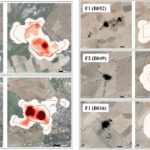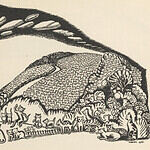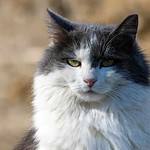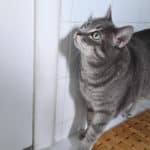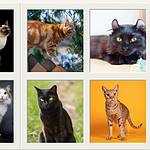While it’s widely known that cats love food, some develop an unhealthy obsession with meal times. Excessive begging can lead owners to overfeed their cats, leading to weight gain and potentially even obesity.
If your cat is obsessed with food, it’s important to learn what causes this, as well as what you can do to curb your cat’s obsession.
What Is Food Obsession?
It’s normal for cats to love food, and some even beg for human food during mealtimes. So long as you are firm and don’t let your cat snack more than it should, this usually isn’t a problem.
Some cats, however, develop an extreme obsession for food.
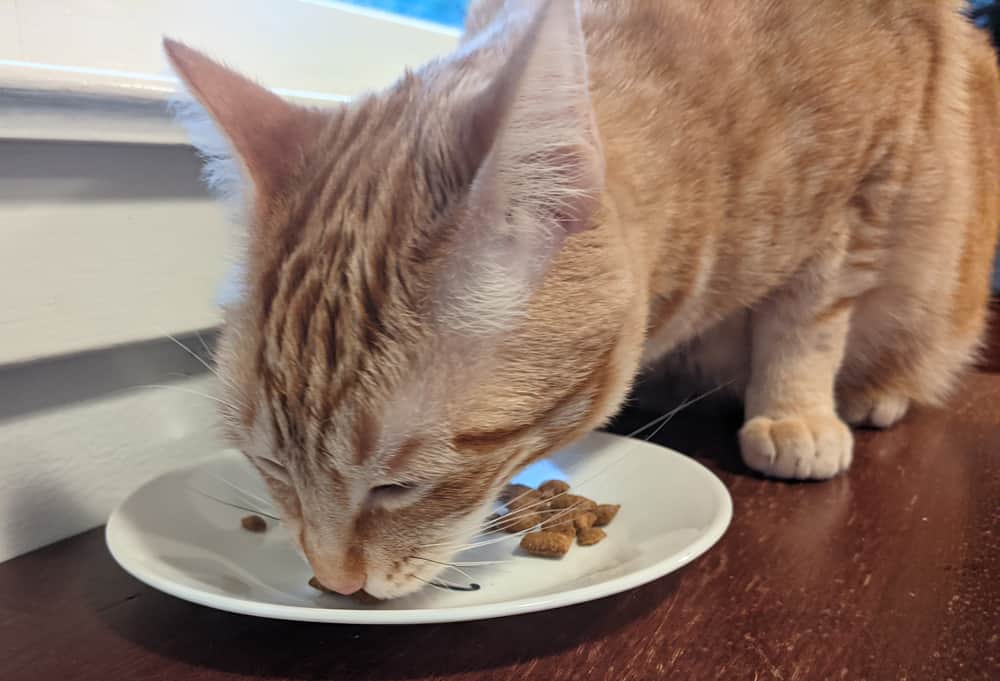
Food obsessed cats will usually eat all of their food as soon as it is given to them, and will beg for more food even after they’ve eaten enough. Unfortunately, many owners find it hard to ignore their cat’s pleas for more food, and end up feeding their cat more than they should.
What Causes Food Obsession in Cats?
The first step to curbing your cat’s food obsession is identifying the cause. There are a lot of different reasons why a cat can become dependent on food, so here are the most common causes.
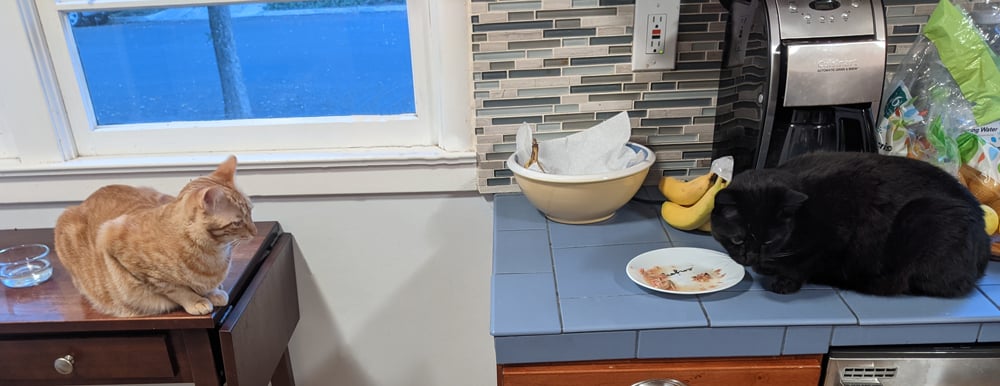
Boredom Can Lead Cats to Overeat
One of the most common causes of food obsession in cats is boredom. Cats need a lot of enrichment to stay occupied, and if their needs aren’t being met, they can become overly dependent on food.
Does your cat have a lot of toys, as well as places to climb and explore? Do you make sure to set aside some time each day to play with your cat?
If not, then your cat is almost certainly suffering from boredom. If your cat is left with nothing to do, it can become restless and destructive, and it might even spend all of its time eating in order to find something pleasurable and exciting to do.
Stressed Cats Make Seek Comfort in Food
Just like humans, cats can use food as a way to soothe themselves in times of stress. Things that we humans might not think about can cause a lot of stress to cats.
Cats are creatures of habit who prefer routine and sameness. A big upheaval in a cat’s routine or way of life, such as moving, introducing a new family member, or even moving furniture around can cause a cat to feel stressed.
Cats can also become stressed if they feel threatened or don’t have enough space to themselves. If you have rowdy children or an aggressive pet in the family, your cat can feel insecure in its environment.
A crowded living space where your cat doesn’t have any room to itself can also be a big stressor. (Related: Why Do Cats Love Boxes?)
Finally, a cat can become stressed due to loneliness. If you spend a lot of time away from home, your cat could be feeling neglected.
Are Your Cats Used to Eating Frequently?
Some cats are food obsessed purely out of habit. Starting in kittenhood, you may have gotten into the habit of feeding your cat whenever it begged for food. Now, your cat might expect to be fed whenever it likes.
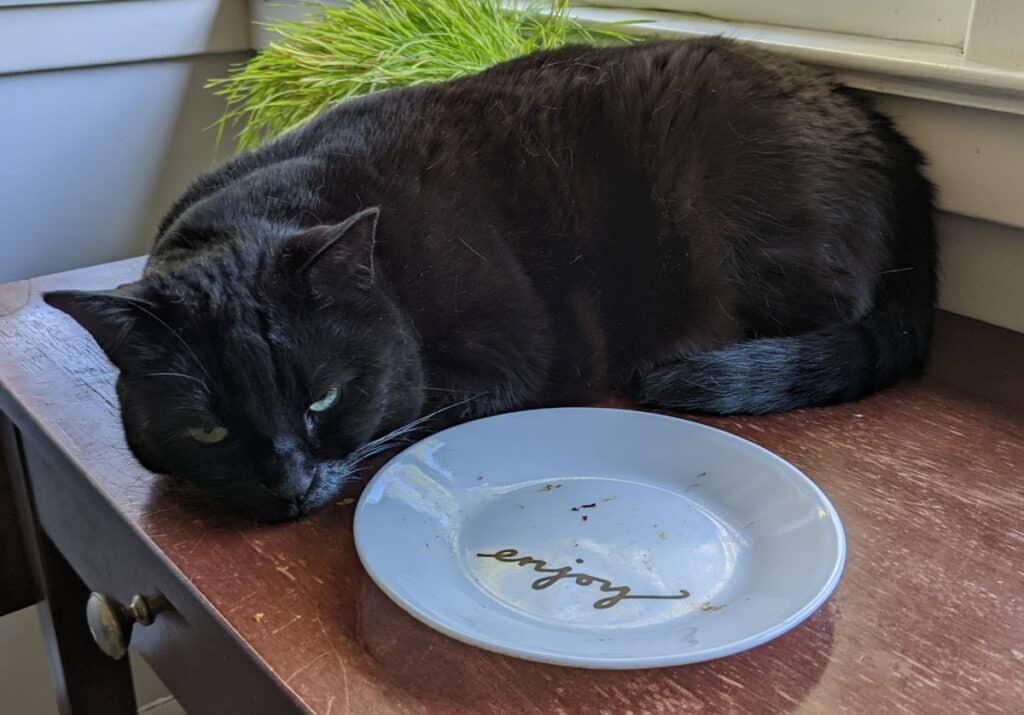
This can be a very difficult habit to break, and it will take time and firmness to end your cat’s food obsession.
When Overeating is a Sign of a Health Issue
Finally, your cat’s food obsession may not be behavioral at all. Unfortunately, there are some underlying illnesses and conditions that can cause a cat to become hungry all the time.
Hyperthyroidism is a condition that increases a cat’s metabolism and causes weight loss. If your cat is eating constantly but seems to be losing weight, then you should take your cat to the vet immediately.
Diabetes is another illness that can lead to an increase in your cat’s appetite as a diabetic cat can’t properly absorb energy from the food they are eating. Keep an eye out for accompanying symptoms such as frequent urination and increased thirst.
Parasites can also cause excessive hunger, and often lead to weight loss as well.
There are several other illnesses and conditions that can cause increased appetite, so look out for any worrying symptoms or changes in your cat’s habits and behavior.
How to Deal with Your Cat’s Food Obsession
If you suspect your cat is obsessed with food due to boredom, then it’s time to introduce some more enrichment into your cat’s life.
Consider getting a cat tree, or even installing shelves along the wall so your cat can run and climb more. Structuring playtime for fifteen to thirty minutes every day is a good way to prevent boredom in your cat, as well. (Related: Why Do Cats Like Crinkly Toys?)
Cat puzzle feeders are one way to slow down eating while introducing some enrichment during meal and treat times.
If your cat is overeating due to stress, try and find out what is causing a negative impact on your cat. Providing a safe space where your cat can retreat to and be left alone when it’s feeling overwhelmed can make a huge difference.
Your cat may be obsessed with food purely out of habit. If this is the case, you’ll have to be firm about only providing meals at set times. It’ll be hard, but you’ll have to ignore your cat’s begging until new, healthier habits are formed.
Finally, if your cat’s increased appetite comes with worrying symptoms like diarrhea, vomiting, weight loss, or lethargy, then it’s time to contact your vet.
Are Some Cats More Likely to Become Obsessed with Food?
It’s common to wonder if certain kinds of cats are more likely to develop problems with overeating than others. For example, a common myth is that orange cats are prone to food obsession.
A cat’s color actually has nothing to do with its temperament; the only genetic difference between an orange cat and any other cat is the color of its fur. However, certain breeds of cats are more prone to overeating than others.
Chartreux and Persians are two cat breeds that are known for their love of food and a tendency to be lazy, which can lead to weight gain.
Highly active breeds like Siamese and Maine Coon cats may be more likely to develop food obsession out of boredom, because they require a lot more enrichment than other cat breeds.
Conclusion
Boredom, stress, poor training, and underlying health problems can all lead to food obsession in cats. If your cat is overeating, figure out the underlying cause so you can properly address the problem. While overeating is usually a behavioral problem that can be remedied through enrichment or environmental changes, you may need to take your cat to the vet if you suspect an underlying health condition.

